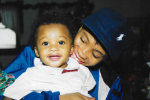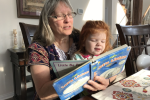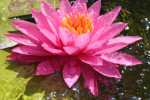I can still see me standing there. Alone. Wary. Exhausted. Confused. And totally at the mercy of the universe.
It was my first international trip. I was on my way to Europe for a month, and it had already been grueling enough for all the regular reasons: While everyone else on the plane lay curled up in soft blankets for a bit of sleep before arrival, I never closed my eyes the entire night. Which meant that the time in Switzerland— going up and down mountain sides, getting on and off increasingly smaller trains with increasingly heavier luggage—got more and more difficult. The last thread snapped when the luggage cart, on which I’d hung my brand-new camera while I jerked suitcases from it to the taxicab, turned up empty when I turned around to retrieve it.
Days later, when I got on the night train for Rome— where I would meet the travel companion who had all the information for the rest of the trip—the adventure had turned more than a little sour, and I had turned more than a little exhausted. Buy the ticket, watch the luggage; get to the train, drag the luggage; struggle up the railroad car steps; lift the luggage. It was all getting to be a bit too much.
This time I would surely sleep. I stacked the large bag in the little compartment, put my legs over it—just to be safe—snuggled up against the window, and went sound asleep. The next thing I heard was the conductor tapping me awake to punch my ticket. “No, no, no,” the conductor was saying, his head shaking, a frown on his face. “What is no, no, no?” I said. He shook my ticket in my face. “No,” he said again. This time more emphatically.
It took a while, but he got through to me when he began to push my luggage down the aisle toward the door. This train was going to Rome, all right, but my ticket was for another train. I was to get out of this one and wait for that one. The engine ground to a stop and I found myself, a foreign woman alone, at a small rural station in the dark of an Italian countryside at two in the morning. Two loud drunks ambled up and down the tracks shouting imprecations at no one in particular.
Other than that, the little station was dark and empty. Completely, totally empty.
I went to the far end of the small platform, dragging my heavy luggage beside me, tired, lost and—if truth were known—scared. I had no idea where I was or what to do next. I had no way to contact anyone for help, including the sister who was waiting for me to join her for the rest of the trip on another train. Somewhere. Sometime.
Thirty minutes, forty-five minutes, passed. Nothing.
Except the drunks, of course, still stabbing at windmills in the air. Then, out of the dark, an old woman, her husband, and a young teenage girl ambled on to the platform. They checked what I learned later was the travel board—which I could not read—opened a brown paper bag, and took out their breakfast panini and cheese. The old man shooed the young drunks away with a shout and a sign.
Suddenly, spying me staring at them from the end of the overhang on the dark walkway, the old woman came down the platform, reached out her hand, hooked her arm through mine, and making the cooing sounds and little patter of mothers and sisters and girlfriends and aunts and grandmothers everywhere, simply walked me up the platform to be with the family for their little makeshift breakfast.
The joy, the relief, the gratitude of a lifetime washed over me in waves. It dissipated the terror I had been fighting down inside of me for hours.
How were Rome and Switzerland, the meetings and the audience with the pope, you ask? I don’t have a clue. I don’t remember another thing about it. The only sliver of memory left of that trip is that tight, caring grip on my arm, that still warm moment of pure unadulterated joy.
SUNDAY, JUNE 1: Joy is not a loud laugh. Joy is the quiet bubbling up, the overflow of the heart that knows it is at home in the universe.
MONDAY, JUNE 2: Without joy, there is something wrong with everything we do. With joy, everything is possible.
TUESDAY, JUNE 3: We get back exactly the amount of joy we give in life. It all starts with me.
WEDNESDAY, JUNE 4: Fun is commonplace. Joy, like diamonds, is a rarer thing, indeed. It is the point at which all we know of security, peace, and contentment comes together in one significant wave. “I have diligently numbered the days of pure and genuine happiness which have fallen to my lot,” Abd al-Raham wrote. “They amount to fourteen.”
THURSDAY, JUNE 5: In the midst of pain, do something good and joyful for yourself. It is important that we not let sorrow consume us. “I have an inward treasure born within me,” Charlotte Brontë wrote, “which can keep me alive if all the extraneous delights should be withheld or offered only at a price I cannot afford.”
FRIDAY, JUNE 6: Joy, amid pain, is the light that beckons us beyond moments that have a great deal to teach us, so that our joy can be even more real in the future.
SATURDAY, JUNE 7: Joy does not simply come to us, like winning lottery tickets, by chance. Joy is something we must take pains to make happen for ourselves and for others.
SUNDAY, JUNE 8: Joy is the elixir of life. Joy is what enables us to remember all our dead loves with a smile for what they gave us rather than only the agony of losing them.
MONDAY, JUNE 9: Those who do not cultivate joy in life never really know life. “People need joy,” Margaret Collier Graham writes, “quite as much as clothing. Some of them need it far more.”
TUESDAY, JUNE 10: Be certain to do something that gives you joy—reading, music, playing with the pet, holding the baby—at least once a day. It makes getting up the next day easier.
WEDNESDAY, JUNE 11: If we have a foundation of joy, we do not lose sight of what is still left to us when sorrows come. “Birds sing after a storm,” Rose Kennedy said. “Why shouldn’t people feel as free to delight in whatever remains to them?”
THURSDAY, JUNE 12: Two things most bind a group into a community: shared sorrow and shared joy. Never ignore either one of them. “The sharing of joy, whether physical, emotional, psychic, or intellectual,” Audre Lorde teaches, “forms a bridge between the sharers which can be the basis for understanding much of what is not shared between them. It lessens the threat of their difference.”
FRIDAY, JUNE 13: When we tell ourselves that we don’t have the time to take time for joy, there is something very wrong with the way we are living our lives.
SATURDAY, JUNE 14: To live life on joys remembered rather than on joy in the here and now is to abandon the very meaning of “life.”
SUNDAY, JUNE 15: Say to yourself a dozen times a day “I like this...”—whatever it is—and joy will begin to seep out of your very pores to everyone you meet. As Jean Webster writes, “It isn’t the great big pleasures that count the most; it’s making a great deal out of all the little ones.”
MONDAY, JUNE 16: Without pain we could never know the real meaning of joy. “A wounded deer,” Emily Dickinson wrote, “leaps highest.”
TUESDAY, JUNE 17: Beware the temptation to isolate yourself in order to avoid the kind of hurts that come from relationships, from risk. “The walls we build around us to keep sadness out,” Jim Rohn writes, “also keep out the joy.”
WEDNESDAY, JUNE 18: It is not the thing itself that brings us either joy or pain. It is the attitude we bring to it. The Buddhist monk Thich Nhat Hanh says of it, “Sometimes your joy is the source of your smile, but sometimes your smile can be the source of your joy.”
THURSDAY, JUNE 19: Joy is not an exercise in perpetual giddiness. It is the practice of perpetual openness to life.
FRIDAY, JUNE 20: The person who is spiritually mature trusts in the presence of a loving God to bring this moment, whatever it is, to ripe in my soul. So as Pir Vilayet Khan says, “The only relevant spiritual question is: Why aren’t you dancing with joy at this very moment?”
SATURDAY, JUNE 21: Learning to celebrate joy is one of the great practices of the spiritual life.
SUNDAY, JUNE 22: It’s not difficult to learn to bear pain, to manage its coming and going, to learn to live with it. What is difficult is to learn to make room for joy in our lives, to allow ourselves to manage its coming and going, to refuse to live without it.
MONDAY, JUNE 23: In order to know joy, it is necessary to open ourselves to new life. When we hide from pain, we forget that wehide from joy as well.
TUESDAY, JUNE 24: What is difficult to remember is that nothing is certain, everything changes. Joys, too, come and go. The problem comes when we allow ourselves to believe that what makes us joyful now will be here forever, rather than be willing to go from one joy to another.
WEDNESDAY, JUNE 25: Whatever it is that we try to hold onto in life will only bring us pain. The poet William Blake said, “He who binds to himself a joy doth the winged life destroy. But he who kisses the joy as it flies lives in Eternity’s sunrise.”
THURSDAY, JUNE 26: Life is meant to be a succession of joys, not one everlasting anesthetizing moment that lasts forever but begins to dull as soon as it happens. The baby’s toothless smile lasts only so long; the dress will be new only once; the vacation will end; all marriages end, one way or another. Then how much life will we have developed in us that will live on beyond it?
FRIDAY, JUNE 27: It is through the lens of joy that we must learn to look at all of life. All of it is good but some of it we don’t recognize when it happens.
SATURDAY, JUNE 28: Joy is as much a responsibility–if not for the cultivation of my own joy, certainly for its presence in the life of those around me–as it is a gift. When we let go of giving or getting joy, we have abdicated our commitment to the goodness of life.
SUNDAY, JUNE 29: To be really holy people, we must stop thinking of joy as an accident of nature and begin to make it a priority. “Always remember,” Rebbe Nachman of Breslov taught, “joy is not incidental to your spiritual quest. It is vital.”
MONDAY, JUNE 30: Remember the old saying, “Two men looked out through prison bars/ One saw mud, the other saw stars”? Well, Abraham Lincoln put it this way: “Most folks are about as happy as they make up their minds to be.”
LET’S SHARE OUR THOUGHTS
The following discussion questions, Scripture echo, journal prompts, and prayer are meant to help you reflect more deeply on The Monastic Way. Choose at least two suggestions and respond to them. You may do it as a personal practice or gather a group interested in sharing the spiritual journey.
DISCUSSION QUESTIONS
1. Sister Joan suggests that cultivating joy is a responsibility for ourselves, for those around us, for our communities. Does this fit at a time when the work is resisting oppression and authoritarianism? Are there models for you of people who have brought or used joy as a tool in a struggles for justice?
2. Which daily quote in The Monastic Way is most meaningful to you? Why? Do you agree with it? Disagree? Did it inspire you? Challenge you? Raise questions for you?
3. After reading The Monastic Way, write one question that you would like to ask the author about this month’s topic.
4. Joan Chittister uses other literature to reinforce and expand her writing. Find another quote, poem, story, song, art piece, novel that echoes the theme of this month’s Monastic Way.
5. On Friday, June 6, Sister Joan writes, “Joy, amid pain, is the light that beckons us beyond moments that have a great deal to teach us, so that our joy can be even more real in the future.” Have you found this to be true in your life? Are there lessons you have learned from moments of joy amid pain?
JOURNAL PROMPTS
Prompt 1: Here are a few statements from this month’s Monastic Way. Choose one that is most helpful to you and journal with it.
• Joy is not a loud laugh. Joy is the quiet bubbling up, the overflow of the heart that knows it is at home in the universe.
• Say to yourself a dozen times a day “I like this...”—whatever it is—and joy will begin to seep out of your very pores to everyone you meet.
• To be really holy people, we must stop thinking of joy as an accident of nature and begin to make it a priority.
Prompt 2: Spend a few minutes with this photograph and journal about its relationship to this month’s Monastic Way. You can do that with prose or a poem or a song or....
PRAYER
May I be peaceful, happy, and light in body and spirit.
May you be peaceful, happy, and light in body and spirit.
May they be peaceful, happy, and light in body and spirit.
May I know how to nourish the seeds of joy in myself every day.
May you know how to nourish the seeds of joy in yourself every day.
May they know how to nourish the seeds of joy in themselves every day.
—Thich Nhat Hanh

 Artwork: by Karen Bukowski
Artwork: by Karen Bukowski




